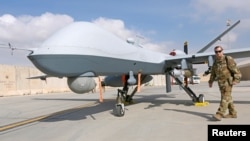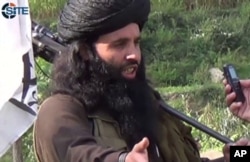Afghan President Ashraf Ghani on Friday telephoned leaders in neighboring Pakistan to confirm that a U.S. drone attack this past week in an eastern Afghan border region killed the leader of the outlawed Pakistani Taliban.
The confirmation came a day after a U.S. official, speaking on condition of anonymity, told VOA the drone strike late Wednesday in the volatile province of Kunar eliminated Mullah Fazlullah, the head of the outlawed Tehrik-e-Taliban Pakistan (TTP), commonly known as the Pakistani Taliban.
"His [Fazlullah's] death is the result of tireless human intel led by Afghan security agencies," Ghani tweeted after speaking to Pakistani military chief General Qamar Javed Bajwa and Prime Minister Nasir ul Mulk.
"They also assured me that the death of Fazlullah is a great step toward building trust between the two nations and promised to support [the] Afghan-led and Afghan peace process," the Afghan president added.
Earlier on Friday, intelligence sources in Pakistan confirmed to VOA the attack in the mountainous Afghan district of Marawara, which connects Kunar to Pakistan, also killed four key TTP commanders.
The slain fugitive TTP chief was leaving a militant center, known as Pachai Markaz, just before midnight on Wednesday after attending a dinner party along with several key commanders.
Sources say as soon as Fazlullah boarded a vehicle, missiles fired from an unmanned American aircraft hit them. Fellow militants later quietly buried Fazlullah and his partners just before dawn on Thursday in a nearby graveyard.
TTP spokespeople were not immediately available to comment on the killing of their chief, but intelligence sources told VOA the militant group was already holding meetings to appoint Fazlullah's successor.
"U.S. forces conducted a counterterrorism strike June 13 in Kunar province, close to the border between Afghanistan and Pakistan, which targeted a senior leader of a designated terrorist organization," a spokesman for U.S. Forces-Afghanistan, Army Lt. Col. Martin O'Donnell, also told VOA, without specifying that Fazlullah was the target.
The slain militant leader was wanted in Pakistan for major terrorist attacks against civilians and security forces.
A Pakistan military statement issued after Bajwa's conversation with President Ghani said the general re-emphasized the need for the two countries to fight terrorism with a "cooperative and coordinated approach."
The statement said Fazlullah was hiding in Afghanistan since 2009 and that his killing "is a positive development. It gives relief to scores of Pakistani families who fell victims to TTP terror."
"Finally an action had been taken against an enemy of the people and state of Pakistan. Mullah Fazlullah continued to coordinate terrorist actions against Pakistan while using Afghan territory," a statement issued by Mulk's office quoted him as telling Ghani.
A Pakistani security official told VOA Friday Fazlullah's killing vindicates Islamabad's long-held belief that fugitive anti-state militants have established bases in "ungoverned spaces" on the Afghan side of the porous border and plot terrorist attacks against Pakistan from there.The official spoke on condition of anonymity.
Kunar and the adjacent Afghan province of Nangarhar are known to harbor bases of Islamic State militants and the TTP. The U.S. military has routinely conducted airstrikes against terrorist hideouts in the two provinces.
U.S. military commanders say that more than 75 percent of IS fighters are former TTP members who have taken shelter in Afghanistan after fleeing counterterrorism operations in Pakistan.
The U.S. State Department offered a $5 million reward for Fazlullah in March, the same month Pakistani sources said his son was killed along with 20 other militants in a U.S. drone strike on a TTP training facility in Kunar.
U.S. officials accused Fazlullah of directing numerous high-profile attacks against American and Pakistani targets since he was appointed the group's leader in 2013. They cited the December 2014 attack on the Army Public School in Peshawar in which 151 people were killed, including more than 130 children.
Washington also blamed Fazlullah for ordering the 2012 attempt to assassinate Pakistani activist Malala Yousafzai, who had been advocating for the right of girls to have access to an education.
The drone attack came after Monday's crucial visit to Kabul by the Pakistani army chief.
In his meetings with President Ghani and U.S. General John Nicholson, who commands American forces and NATO's non-combatant Resolute Support mission, Bajwa discussed bilateral and counterterrorism cooperation.
A Pakistan military spokesman later said Bajwa's discussions also focused on "measures needed to check (the) rise of ISIS (Islamic State) and the issue of terrorists taking benefit of the porous border to indulge in terrorism, smuggling and drug trafficking, being often networked together."
The drone attack occurred during a cease-fire between the Afghan Taliban and government security forces to mark the end of the Muslim fasting month of Ramadan.
Gen. Nicholson said the United States would adhere to the unilateral cease-fire, announced by President Ghani, which did not apply to U.S. counterterrorism attacks on other terror groups.
"As previously stated, the cease-fire does not include U.S. counterterrorism efforts against IS-K, al-Qaida, and other regional and international terrorist groups, or the inherent right of U.S. and international forces to defend ourselves if attacked," U.S. military spokesman O'Donnell told VOA.
Hopes are running high the unprecedented cease-fire in Afghanistan could pave the way for peace talks between the Kabul government and the Taliban.
President Ghani noted in his statement Friday after speaking to the Pakistanis that he urged them "to take practical steps to bring [the] Afghan Taliban residing in Pakistan to the negotiation table."He was referring to long-standing Afghan allegations that the Taliban are using Pakistani soil for attacks inside Afghanistan.
Islamabad rejects the charges and maintains Pakistani security forces have undone all insurgent sanctuaries on their soil but, they maintain that nearly 3 million Afghan refugees in the country continue to pose challenges for Pakistani forces to completely flush out remnants of the insurgents.
Jeff Seldin contributed to this report.





